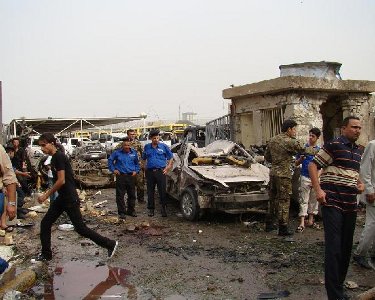
Canon Andrew White, the Anglican leader of St. George’s church in Baghdad, said the twin truck bombing Sunday “almost totally ruined” the church compound, which includes a medical clinic, bookstore and school.
“Everything is destroyed,” he wrote Sunday in an e-mail update. “The windows themselves were all blown out. Not just the glass but the frames were even blown out. All of the cars in the compound were destroyed. Even the Danish Memorial was destroyed. Almost everything we put in the church and clinic is totally destroyed.”
More than 150 people were killed Sunday and another 600 injured when two suicide car bombs blew up almost simultaneously outside the Justice Ministry and city government offices in downtown Baghdad. The coordinated attacks were the deadliest since a series of massive truck bombs in northern Iraq killed nearly 500 villagers in August 2007, the Associated Press reported.
Although Sunday services had not started, the downtown church “was full of body parts,” White said. As of Sunday, some church members could not be located.
“Today was a terrible day for us,” White wrote. “But even in the blood and trauma and turmoil, there are things for which we can, and indeed must, praise our G-d. The carnage was terrible, but it could have been even worse.”
The bomb hit at 10:30 a.m. when no one was in the church. “If the bomb had been just a few hours later, the glass from the windows would have ripped through the congregation causing terrible human damage,” White said.
He added that a storm on Saturday felled a huge tree outside the church, preventing the suicide bomber from detonating his explosives at a place where they could have caused even more damage.
Known as “the vicar of Baghdad,” White is the founder of the Foundation for Relief and Reconciliation in the Middle East and has spearheaded the religious track of the Middle East peace process, which aims to bridge the divides among Muslim, Jewish and Christian communities.
The 2,000-member St. George’s church provided a free medical and dental clinic to Iraqis, regardless of their religious or ethnic background. The facility was staffed by a team of Muslim, Christian and Jewish doctors and outfitted with expensive medical equipment.
“In a moment, much of this equipment has been destroyed, placing it permanently out of reach of the Iraqi people who need it so desperately,” White said.
The bombing is a reminder of that the church’s work in Iraq is “absolutely essential,” White added.
“We must continue to provide a place of worship for Iraqi Christians,” he said. “We must continue to treat the medical needs of Iraqi civilians. And we must continue to engage with the senior religious leaders from across the sectarian divides, working with them to challenge the belief systems that lie behind this terrible slaughter.”
Saying “we will not stop because of this,” White has requested financial assistance for a rebuilding effort.












































